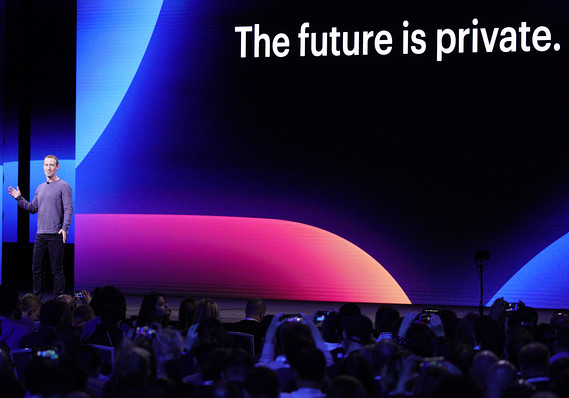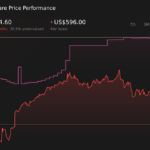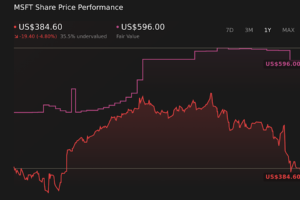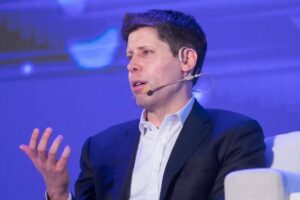Facebook wants you to join groups and have more meaningful conversations.
This week, Facebook FB, +1.53% unveiled the platform’s first major redesign for the website and mobile app since the social network was launched in 2004. Chief Executive Mark Zuckerberg said he wants users to have more group conversations to help reduce abusive content. In a speech at F8, Facebook’s annual developers’ conference, Zuckerberg showcased the new look that sacrifices the iconic blue banner at the top of the page in order to put “groups at the heart of the app.”
Zuckerberg stood front of a giant screen with the words, “The future is private.’ However, privacy advocates and communications experts are skeptical about the site’s redesign. While they agree that it’s in Facebook’s best interests to improve privacy, they also say that users won’t be distracted by Facebook’s logo and see the platform as more integrated into their desktop, while online groups will encourage them to reveal even more personal beliefs and details from their lives.
‘Now we’re focused on building the digital equivalent of the living room, where you can interact in all the ways you’d want privately.’
“There’s something more at work here,” says Adam Levin, founder of Scottsdale, Ariz.-based CyberScout, a global data and identity protection company. “By creating groups we will be doing Facebook’s work for it. The more people who come together to talk about their interests — whether they’re political, financial or religious — the more data Facebook can collect. There’s nothing more delicious for Facebook than having people come into groups and talk.”
According to the company, more than 400 million of the company’s 2.37 billion active users are already participating in groups, where Facebook users come together around common interests, from swapping Instant Pot recipes to helping each other through the same cancer diagnosis. Critics agree, but they also say that encouraging groups of people to share their passions and interests is all about driving advertising. The more intimate those conversations, the more valuable the data.
In an Instagram post this week, Zuckerberg wrote, “Now we’re focused on building the digital equivalent of the living room, where you can interact in all the ways you’d want privately — from messaging and stories to secure payments and more.” He added, “We’ve redesigned Facebook to make communities as central as friends. We’ve added new ways to buy things securely on Instagram.” Zuckerberg described this process as a “journey to build a private social platform.”
Don’t miss: You risk more than your data on Facebook
That online “living room” concept alarms some communications experts. “There are surveillance cameras in those living rooms,” said Karen Kovacs North, a professor at USC Annenberg School for Communication and Journalism. “We forget that the company that’s hosting our conversation is also listening. If we are lured into the false sense of security that we’re in a private living room and can speak freely, we might say things that we would absolutely not want others to hear.”
‘There are surveillance cameras in those living rooms. We forget that the company that’s hosting our conversation is also listening.’
People may be more likely to reveal illnesses, mental-health issues or even quirky or embarrassing hobbies, she said. This could be anything from men who like Mattel MAT, -1.15% Barbie dolls and My Little Pony to Donald Trump supporters living in liberal enclaves that would be otherwise reluctant to share their political views, Kovacs North said. “Anything you think is private is public, and anything you think is temporary is permanent. Facebook aggregates data for advertisers, but other people can simply take a screenshot,” she added.
Facebook has a controversial history of data mishaps. Last year, U.K.-based Cambridge Analytica improperly accessed 87 million Facebook users’ data. In the aftermath of that scandal, Facebook users received a message called “Protecting Your Information,” laying out the third-party apps that had access to individual Facebook profiles. Zuckerberg also issued a mea culpa, and pledged to be more careful when vetting these third party apps. But he said fixing the problem could take years.
A spokesman for Facebook defended the latest redesign. “We regularly hear from people who tell us that groups are now a central part of their Facebook experience,” he told MarketWatch. “They are an everyday resource for people to connect over things they care about — a place to exchange new recipes, learn what’s happening in their neighborhood or simply bond over a love of dogs. And they are also a place where people share life events, like moving, parenthood or new careers.”
 Getty Images
Getty Images
Not everyone is convinced. Aram Sinnreich, professor of communications at American University in Washington, D.C., said Facebook is paring away the “dead weight” that’s impeded its business model for some time. Deleting Facebook’s logo on the desktop is a strategic move rather than a sacrifice, he said, and will help the brand to become less intrusive. “Ultimately, users will not notice it any more than they notice the interface of the browser software they use to surf the web.”
‘The timeline interface was a convenient fiction that obscured their actual function and business model to mine as much data about users as possible.’
The redesign will also put less emphasis on the platform’s “News Feed,” in part because that’s where many users come across abusive content and fake news stories, The Wall Street Journal reported. People may be less reluctant to log onto Facebook, particularly in this increasingly polarized political climate. Critics, meanwhile, say these online groups will help users explore their innermost beliefs and reveal their most closely-held secrets.
“The ‘timeline’ interface was, for most of the company’s history, a convenient fiction that obscured their actual function and business model, which was to mine as much data about users as possible, and sell access to those users to brands, advertisers, and other users,” Sinnreich added. However, fake news and other forms of disinformation have polluted the timeline experience and sullied Facebook’s brand, he added. “There’s no reason for them to retain the fiction any longer.”
The biggest redesign since 2004 simply reveals Facebook’s core business model, Sinnreich said. “The reorganization emphasizes Facebook’s role as an intermediary platform for communications and social commercial services — dating, employment, marketing — while de-emphasizing its role as a ‘publisher’ of a ‘destination site.’ The design change, which many will no doubt excoriate, is actually very central to this plan. Facebook is becoming transparent, unobtrusive, and bland.”
Don’t miss: 5 reasons you will never quit Facebook
Others see Facebook’s redesign as a more genuine effort to encourage people to have more considered conversations. The #DeleteFacebook hashtag went viral in response to privacy scandals and caused some people to leave Facebook, post less frequently or share less personal information, says Melanie Green, a professor in the Department of Communications at the University of Buffalo. “Therefore, people may be seeing less content from their personal friends.”
‘The more people who come together to talk about their interests — whether they’re political, financial or religious — the more data Facebook can collect.’
Similarly, Bastiaan Vanacker, program director for the Center for Digital Ethics and Policy at Loyola University Chicago, says Facebook is trying to adapt to a constantly evolving advertising market. “As excellent as Facebook is at targeting ads, the advertising paradigm in which ads are sent to a passive receiver is slowly being replaced by a universe in which native advertising, sponsored content and influencers are becoming the drivers behind brand communication,” he said.
Targeting advertisements to groups of people is naturally driven by dialogue and interaction, and will help make the experience more relevant and meaningful for users, Vanacker says. After all, Facebook is a free service that people sign up to voluntarily. “Facebook’s actions from the past warrant some skepticism about its new-found commitment to privacy, but I am not convinced that this change should be seen as an attempt to collect more data about us,” he adds.
Adam Levin disagrees. He says more relevant user experience and more meaningful content inevitably means Facebook needs more meaningful data from users too. “We’re about to enter the most hotly contested presidential election in modern history. Imagine the data Facebook can acquire from group chats. They give Facebook an opportunity to virtually eavesdrop. Mark Zuckerberg wants you to think that it’s all about you. And it is. But not exactly in the way that you think.”
Facebook’s stock was up 48% year-to-date, versus a rise of 17.5% in the S&P 500 SPX, +0.96% and an increase of 14.1% in the Dow Jones industrial Average DJIA, +0.75%
Get a daily roundup of the top reads in personal finance delivered to your inbox. Subscribe to MarketWatch’s free Personal Finance Daily newsletter. Sign up here.








